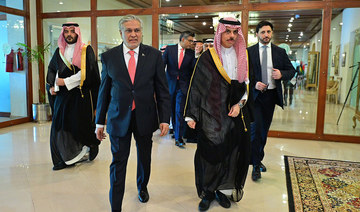KARACHI: A grand alliance of young doctors, nurses and paramedics on Wednesday announced to boycott Out-Patient Departments (OPDs) in government-run hospitals across the southern Sindh province, a step that is likely to further aggravate the ongoing health crisis related to the coronavirus pandemic in the country.
“Since the government didn’t pay any heed to our demands despite our three-day token boycott which ended today, we have decided to completely boycott the OPDs,” Dr. Mehboob Ali, convener of the alliance and general secretary of the Young Doctors’ Association (YDA), told Arab News, adding that doctors and paramedics would continue to perform duties in emergencies, emergency operation theaters and isolation centers for COVID-19 patients.
The young doctors and paramedics have been protesting against the non-provision of personal protective equipment (PPE), risk allowance, establishment of separate isolation wards for health workers infected by the novel virus and provision of proper security and salaries.
Ejaz Kaleri, a representative of paramedics, said that since the government had failed to fulfill the medical community’s just demands, the country’s officials were also responsible for any suffering that might result from the closure of OPDs.
“We are dying due to non-provision of protective gear. The relatives of patients are attacking us. But the government is not ready to protect us against the people and the virus,” Kaleri told Arab News, adding the next stage of protest strategy would be boycott of emergencies and COVID-19 isolation centers.
A spokesperson for the Sindh health department said that the health minister had directed the relevant authorities to meet YDA representatives and address their demands. However, no officials had contacted the association until the filing of this report.
Meanwhile, senior doctors and their representatives said they “fully supported” the alliance’s demands but a boycott at such a critical juncture was not right.
“We will never support any boycott since patients have not done anything wrong. We support the demands of the grand alliance but boycott is not the right way,” Dr. Qaiser Sajjad, general secretary of the Pakistan Medical Association (PMA), told Arab News
Dr. Azeem Siddiqui, a senior doctor and president of the Pakistan Islamic Medical Association, Karachi, echoed the same sentiment.
“We never supported and will not support any strike as we can never deny our patients their rights, especially at present. However, the concerns of the YDA and paramedics are genuine,” Siddiqui told Arab News, adding that the provision of PPE and recognition of services provided by doctors had not been satisfactory on the governmental level.
“Their demand for compensation of their services is also genuine. So, the government must seriously look into their demands and try to solve the issue as early as possible,” he said.
Siddiqui added that the health care system was already under a lot of pressure and it was becoming extremely difficult for patients to get a bed, especially in ICUs, at different medical facilities.
“Due to the difference in strategy between the province and the center … a second lockdown does not appear to be a serious possibility at this moment,” he continued when asked about the World Health Organization’s recommendation regarding an intermittent lockdown.
“What we need to do is enhance our existing facilities urgently,” Siddiqui suggested.
Young doctors, paramedics boycott OPDs in Sindh
https://arab.news/2nj63
Young doctors, paramedics boycott OPDs in Sindh
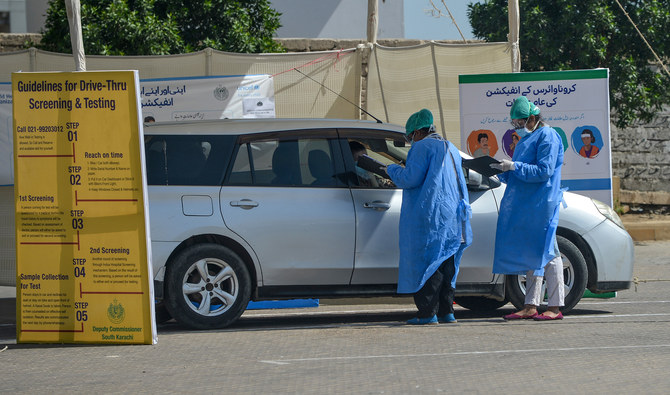
- Seek protective gear, risk allowance and establishment of separate COVID-19 isolation wards for health workers
- Health experts not too optimistic about the re-imposition of intermittent lockdown
Saudi deputy defense minister discusses security cooperation proposals with Pakistan army chief
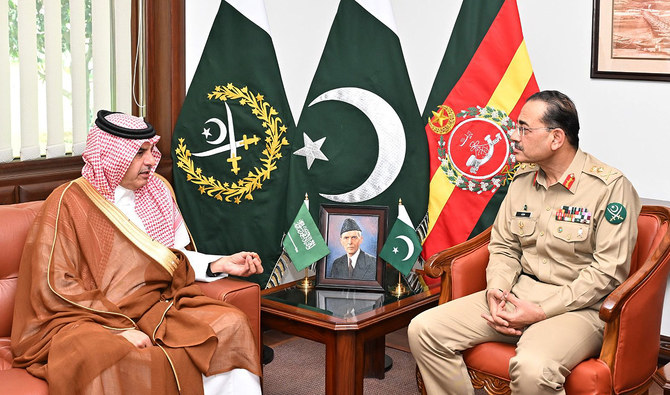
- Al-Otaibi arrived in Pakistan earlier this week to finalize defense-related bilateral projects
- Saudi official participates in the Fifth Meeting of Pakistan-KSA Defense Collaboration
ISLAMABAD: Saudi Assistant Defense Minister Talal Bin Abdullah Bin Turki Al-Otaibi called on Pakistani Chief of Army Staff Gen Syed Asim Munir on Friday and discussed defense collaboration projects, the Pakistani military said on Friday.
Al-Otaibi arrived in Pakistan earlier this week to finalize defense-related bilateral projects, according to the Pakistani defense ministry. His visit follows on the heels of a two-day visit to Islamabad by Saudi Foreign Minister Faisal bin Farhan Al Saud, aimed at enhancing bilateral economic cooperation and pushing forward previously agreed investment deals. Pakistan has said it pitched investment projects worth$30 billion to Riyadh during Prince Faisal’s visit.
“During the meeting, matters of mutual interest and measures to further enhance bilateral defense collaboration including defense production and military training were discussed,” the Pakistan army statement said.
“COAS affirmed Pakistan Army’s continuing support toward capacity building of Royal Saudi Land Forces.
“Both sides reiterated their resolve to solidify the efforts in defense collaboration with focused approach to target specific capabilities in land, air and sea domains. In this context, concrete proposals were deliberated by the forum to meet tangible objectives within specific timelines.”
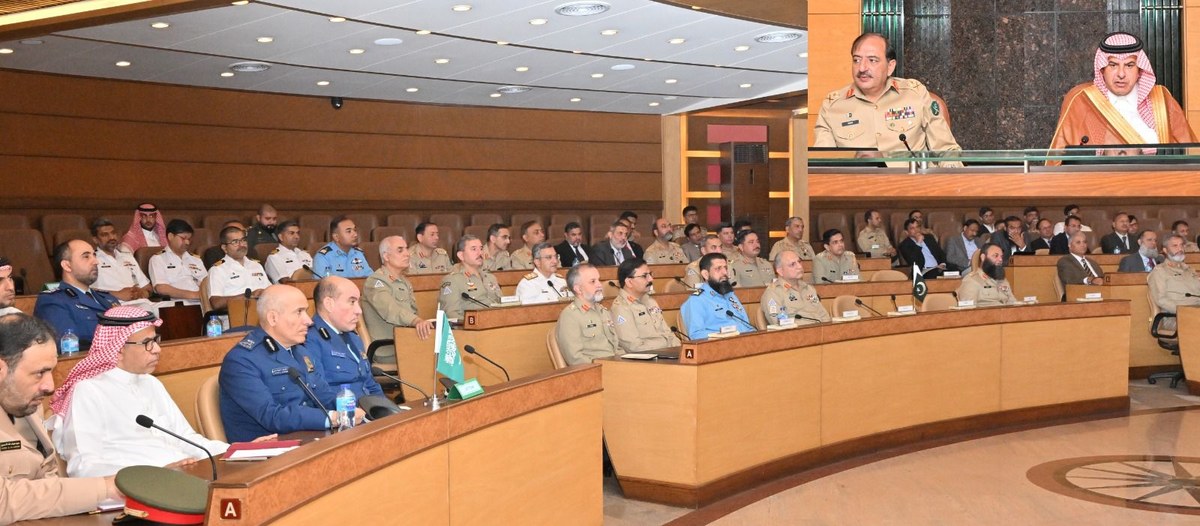
Al-Otaibi also participated in the Fifth Meeting of Pakistan-KSA Defense Collaboration at the Pakistan army’s headquarters in Rawalpindi.
The forum discussed challenges to global and regional security and noted that rapid advancements in modern technologies “necessitated defense industrial cooperation in critical capabilities between the two brotherly countries.”
“The visiting dignitary acknowledged Pakistan Army’s achievements and sacrifices in war against terrorism and Army’s valuable contributions toward regional peace and stability,” the army’s statement said.
Pakistan maintains close military ties with Saudi Arabia, providing extensive support, arms, and training to the Saudi armed forces.
Since the 1970s, Pakistani soldiers have been stationed in Saudi Arabia to protect the Kingdom and Pakistan has also been providing training to Saudi soldiers and pilots. The two nations also regularly carry out multidimensional joint ventures and defense exercises.
Five Japanese workers narrowly escape suicide bombing that targeted their vehicle in Pakistan
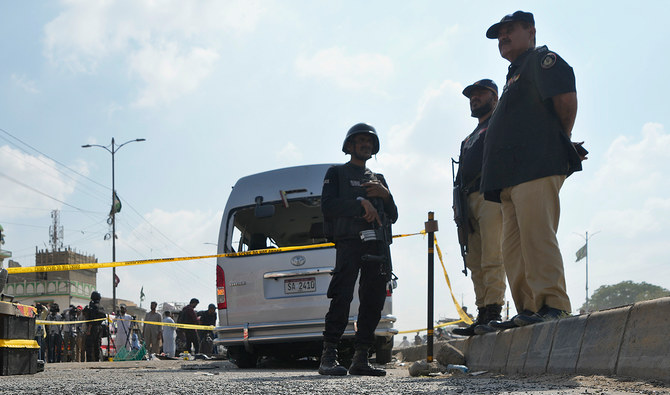
- Van had been heading to an industrial area where the five Japanese nationals worked at Pakistan Suzuki Motors
- Insurgents have also targeted Chinese working on Pakistan on projects relating to the China-Pakistan Economic Corridor
KARACHI: A suicide bomber detonated his explosive-laden vest near a van carrying Japanese autoworkers, who narrowly escaped the attack Friday that wounded three bystanders in Pakistan’s port city of Karachi, police said.
The van had been heading to an industrial area where the five Japanese nationals worked at Pakistan Suzuki Motors, local police chief Arshad Awan said. He said police escorting the Japanese returned fire after coming under attack, killing an accomplice of the suicide bomber whose remains were found from the scene of the attack.
“All the Japanese who were the target of the attack are safe,” he said.
Images on local news channels showed a damaged van, as police officers arrived at the scene of the attack. Awan said the three passersby who were wounded in the attack were in stable condition at a hospital.
Police were escorting the van after receiving reports about possible attacks on foreigners who are working in Pakistan on various Chinese-funded and other projects, said Tariq Mastoi, a senior police officer. He said a timely and quick response from the guards and police foiled the attack and both attackers were killed.
No one immediately claimed responsibility, but suspicion is likely to fall on a small separatist group or Pakistani Taliban who have stepped up attacks on security forces in recent years. Insurgents have also targeted Chinese who are working on Pakistan on projects relating to the China-Pakistan Economic Corridor, which includes a multitude of megaprojects such as road construction, power plants and agriculture.
In March, five Chinese and their Pakistani driver were killed when a suicide bomber in northwest Pakistan rammed his explosive-laden car into a vehicle when they were heading to the Dasu Dam, the biggest hydropower project in Pakistan, where they worked.
However, Japanese working in Pakistan have not been target of any such attacks.
Karachi is the largest city of Pakistan and the capital of southern Sindh province.
Pakistan police kill bomber, militant to thwart attack on Japanese nationals
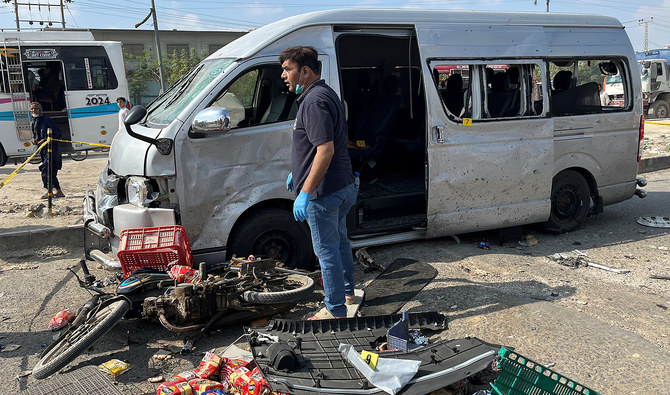
- Japanese survivors moved to a safe place in police custody, police says
- No immediate claim of responsibility for the attack from any militant group
KARACHI: Police in Pakistan’s southern city of Karachi shot down a suicide bomber and a militant on Friday as they attacked a vehicle carrying five Japanese nationals, all of whom survived, a police spokesperson said.
Islamist militants seeking to overthrow the government and set up their own strict brand of Islamic rule have launched some of Pakistan’s bloodiest attacks over the last few years, sometimes targeting foreigners, such as Chinese.
The Japanese survivors have been moved to a safe place in police custody, the police spokesperson, Abrar Hussain Baloch, said.
There was no immediate claim of responsibility for the attack from any militant group.
Pakistan seeks to engage with Global Gateway Strategy through European Investment Bank
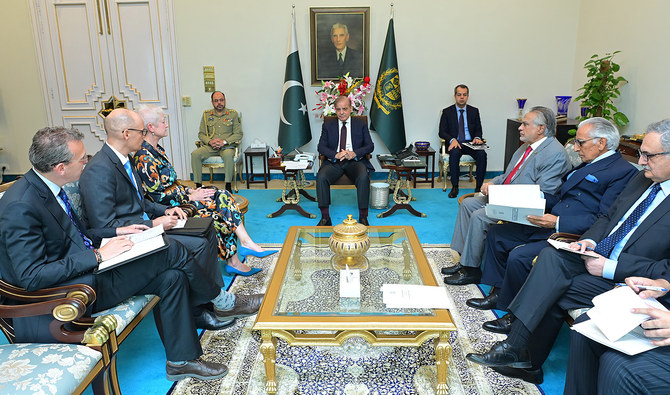
- EU to invest in infrastructure projects worldwide under Global Gateway Initiative
- Over the period 2021–2027, the European Union seeks to invest €300 billion
ISLAMABAD: Prime Minister Shehbaz Sharif on Thursday met Ambassador of the European Union, Riina Kionka, and sought the EU’s support to help Pakistan carry out important reforms in various sectors and engage with the Global Gateway Strategy through the European Investment Bank.
The EU is Pakistan’s second most important trading partner, accounting for over 14 percent of Pakistan’s total trade and absorbing 28 percent of Pakistan’s total exports. Pakistani exports to the EU are dominated by textiles and clothing.
“The Prime Minister appreciated the continuous support of the European Union to Pakistan regarding the GSP Plus scheme,” a statement from the PM’s office said about his meeting with Kionka.
“The Prime Minister said that the European Union can play an important role in providing consultation and expertise for important reforms in various sectors in Pakistan.”
Pakistan’s GSP+ status is a special trade arrangement offered by the EU to developing economies in return for their commitment to implement 27 international conventions on human rights, environmental protection and governance.
The current GSP framework came to an end in December 2023 but Members of EU Parliament (MEPs) voted in October to extend the current rules on the scheme for another four years for developing countries, including Pakistan.
During his meeting Kionka, Sharif expressed satisfaction over existing institutional mechanisms “meeting regularly to exchange views on further strengthening cooperation” and indicated Pakistan’s interest in engaging constructively with the EU’s Global Gateway Strategy through the European Investment Bank.
The Global Gateway Initiative is a worldwide strategy by the European Union to invest in infrastructure projects worldwide. The project was initiated by the EU Commission under the leadership of Ursula von der Leyen. Over the period 2021–2027, the EU will invest €300 billion.
The EU Ambassador briefed the PM on various cooperation initiatives, including an ongoing dialogue on migration and mobility issues between the two sides, as well as facilitating European businesses operating in Pakistan. Progress on the resumption of flights from Pakistan to EU countries was also discussed.
Pakistani finance minister, Saudi Fund for Development discuss funding for dam, highway
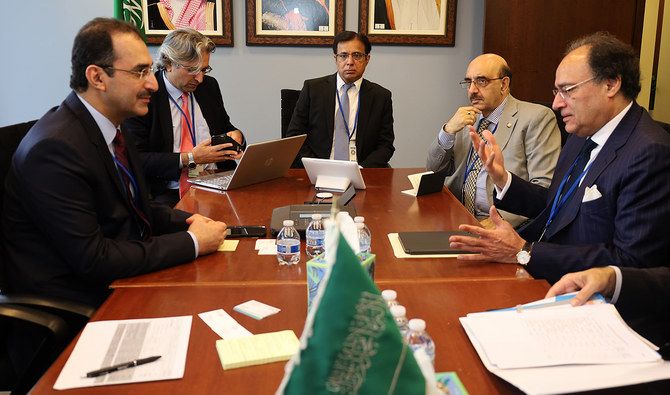
- Aurangzeb is in Washington for IMF and World Bank spring meetings
- Saudi FM was recently in Pakistan to discuss investment projects
ISLAMABAD: Federal Minister for Finance Muhammad Aurangzeb met with Sultan Abdulrahman Al-Marshad, CEO Saudi Fund for Development (SFD), in Washington on Thursday and discussed investable projects, including a dam and a major national highway.
Aurangzeb is in Washington for IMF and World Bank spring meetings. As he launches negotiations for a new three-year multi-billion-dollar bailout deal from the IMF, Saudi Foreign Minister Prince Faisal bin Farhan Al Saud was in Islamabad earlier this week where he said Riyadh would be “moving ahead significantly” to invest in projects in the South Asian nation.
The Saudi official’s visit followed a meeting in Makkah between Prime Minister Shehbaz Sharif and Saudi Crown Prince Mohammed bin Salman in which the Kingdom had pledged to expedite $5 billion in investments.
“Briefed him [SFD CEO] about his recent visit to Saudi Arabia and that of Saudi delegation to Pakistan during this week,” the finance ministry said about the meeting between the Pakistani finance minister and the Saudi official in Washington.
“Expressed satisfaction with the progress of ongoing projects. Discussed the funding of Diamer Bhasha dam and N-25 from Karachi to Chaman. Informed that Pakistan would pitch bankable and investable projects to Saudi investors.”
Diamer-Bhasha Dam is a concrete-filled gravity dam, in the preliminary stages of construction, on the River Indus between Kohistan district in Khyber Pakhtunkhwa and Diamer district in Gilgit Baltistan. Upon completion, the dam dam would produce 4800 megawatts of electricity through hydro-power generation, store an extra 10.5 cubic kilometers of water for Pakistan that would be used for irrigation and drinking, extend the life of Tarbela Dam located downstream by 35 years, and control flood damage by the River Indus downstream during high floods.
The N-25 or National Highway 25 is an 813 km national highway in Pakistan which extends along from Karachi, Pakistan’s commercial hub, in Sindh province to the Chaman border via Quetta in the Balochistan province of Pakistan.
During the Saudi FM’s visit this week, investments in the Pakistani sectors of mining and minerals, agriculture, energy, information technology and infrastructure development were discussed. Speaking to journalists on Thursday, Foreign Minister Ishaq Dar said Pakistan had pitched an “epic menu” of investment projects worth $30 billion to Riyadh during Prince Faisal’s visit.
Pakistan and Saudi Arabia enjoy strong trade, defense and cultural ties. The Kingdom is home to over 2.7 million Pakistani expatriates and the top source of remittances to the cash-strapped South Asian country.




